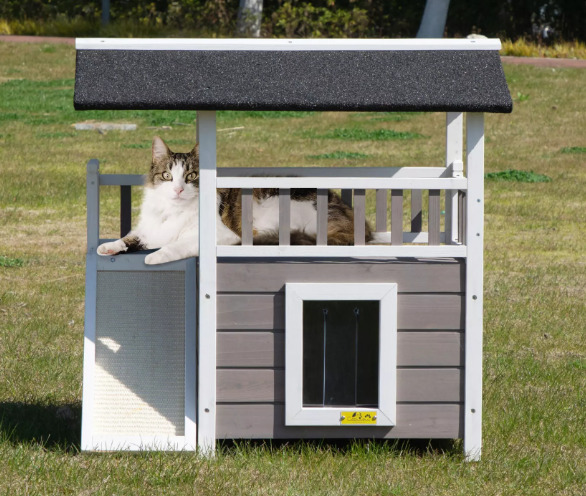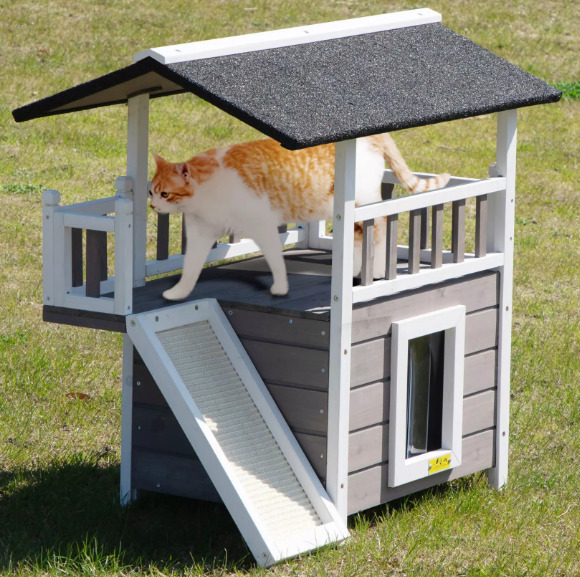Cats are cherished members of our families, providing companionship, comfort, and endless entertainment. However, unlike dogs, cats are known for their independence and ability to entertain themselves. While this is one of their endearing qualities, it also raises the question: How long can you leave a cat in cat house alone? As responsible pet owners, it’s essential to strike a balance between your cat’s independence and their need for care and attention.
Understanding Your Cat’s Independence
Before we dive into the specifics of how long you can leave your cat in cat houses alone, it’s crucial to understand your feline friend’s nature.
Independent Creatures: Cats are inherently independent animals. They have evolved as solitary hunters and are equipped with the skills to fend for themselves to some extent.
Social Variability: Cats’ social needs can vary widely from one individual to another. Some cats are highly social and crave human interaction, while others are more reserved and content with occasional company.
Stimulation Needs: Cats need mental and physical stimulation to stay happy and healthy. They can become bored if left alone in cat house for extended periods.
Basic Needs: Like all pets, cats have basic needs for food, water, a clean cat litter box, and a safe environment.

Factors Affecting Alone Time in Cat House
The amount of time you can leave your cat alone depends on several factors.
Age: Kittens and young cats generally require more attention and supervision than adult cats. Cats tend to become more independent as they grow older. While kittens are reliant on constant care, adult cats usually adapt well to alone time. However, it’s important to introduce alone time in cat house gradually, starting from shorter durations and gradually extending it as your cat becomes more accustomed to being by themselves.
Health: Cats with health issues or special dietary needs may require more frequent check-ins. Regular vet check-ups are crucial for your cat’s overall health. Schedule these appointments and ensure someone can take your cat in cat house to the vet if necessary while you’re away.
Temperament: Your cat’s personality plays a significant role. Some cats tolerate being alone for longer periods, while others get lonely quickly. For social cats, it’s crucial to arrange for regular human interaction. Have a trusted friend, family member, or pet sitter spend time with your cat during your absence to provide companionship. Independent cats may fare better with more extended periods of alone time. However, they still require daily care, including food, water, and a clean cat litter box.
Socialization: Cats that are well-socialized from an early age may handle alone time better than those with limited social exposure. Social cats are typically outgoing, enjoy interacting with people and other animals, and are more resilient in the face of solitude. They may tolerate being alone for longer periods. Shy or timid cats may have a harder time with alone time in cat house, as they are more sensitive to changes in their environment and may be prone to stress or anxiety.
Entertainment: Providing toys, scratching posts, and interactive play options can help keep your cat engaged in cat house during your absence.
Guidelines for Leaving Your Cat in Cat House Alone
Now, let’s discuss some general guidelines for determining how long you can leave your cat alone in cat house without compromising their well-being.
Daily Check-Ins: It’s ideal to check on your cat at least once a day. Even if your cat is generally independent, this allows you to ensure they have access to fresh water, food, and a clean cat litter box.
Short Trips: For short trips (a day or less), most cats can manage alone in cat houses with the essentials provided. Ensure you leave enough food and water for the duration of your absence.
Weekend Getaways: If you’re planning a weekend getaway, arranging for a trusted friend or pet sitter to check on your cat every day or every other day is a good practice. They can provide companionship and check that everything is in order.
Extended Absences: For longer trips, such as vacations, it’s best to have someone visit your cat daily or opt for pet boarding. Cats can become stressed when left alone in cat houses for extended periods.
Interactive Toys: Invest in interactive toys, puzzle feeders, or automated laser pointers in cat houses to keep your cat mentally and physically engaged during your absence.
Consider a Second Cat: If you’re often away for extended periods, consider adopting a second cat as a companion. Cats can form strong bonds with each other, providing company and reducing loneliness.

Preparation of Cat House Before Leaving
Before leaving your cat alone, take the following steps to ensure their comfort and safety.
Prepare Plenty of Essentials: Stock up on enough food, water, and litter to last throughout your absence.
Secure the Environment: Ensure the cat house is safe and cat-proofed to prevent accidents or hazards.
Leave a Comfortable Space: Create a comfortable cat house for your cat with cozy bedding and access to their favorite spots.
Interactive Toys: Set out interactive toys in cat houses and rotate them to keep your cat entertained.
Temperature Control: Ensure the cat house is at a comfortable temperature, especially during extreme weather conditions.
Contact Information: Leave contact information for a trusted friend, neighbor, or pet sitter in case of emergencies.
Cats are wonderfully self-sufficient creatures, but they still rely on us for their well-being and happiness. How long you can leave your cat alone in cat houses depends on their individual needs and circumstances. By understanding your cat’s temperament, providing essentials, and arranging for appropriate care during your absence, you can strike a balance between their independence and their need for companionship and care. Remember, responsible pet ownership includes ensuring that your feline friend is content and well-cared for, whether you’re at home or away.

